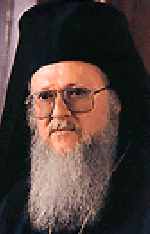
John Paul II
Catholic, Bishop of Rome, Pope
![]() Introduction
Introduction
![]() 4 Competing views of organization
4 Competing views of organization
![]() Outline: 33-150 AD
Outline: 33-150 AD
![]() Outline: 150-250 AD
Outline: 150-250 AD
![]() Outline: 250-451 AD
Outline: 250-451 AD
![]() Outline: 588-606 AD
Outline: 588-606 AD
![]() Outline: 606 AD-Today
Outline: 606 AD-Today
![]() Catholic organization today
Catholic organization today
![]() Orthodox organization today
Orthodox organization today
![]() True Bible organization today
True Bible organization today
![]() Find a local congregation of the New Testament church in your own home town.
Find a local congregation of the New Testament church in your own home town.

Bartholomew
Orthodox, Archbishop of Constantinople, New Rome and Ecumenical Patriarch
